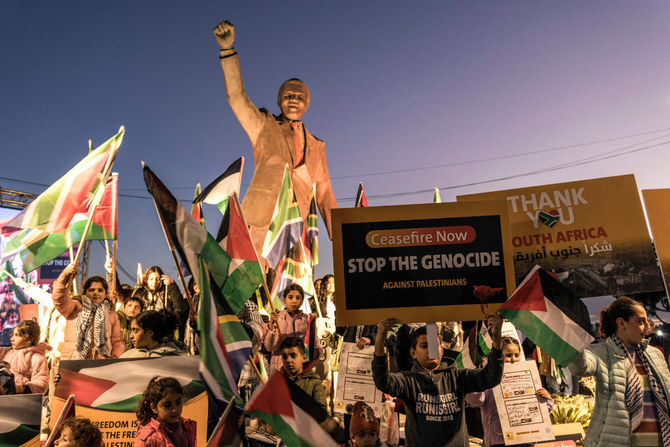RAMALLAH, Palestinian Territories: Dozens of Palestinians gathered Wednesday in front of the statue of Nelson Mandela in the occupied West Bank to thank South Africa for bringing a “genocide” case against Israel over its bombardment of Gaza.
The crowd waved Palestinian flags, listened to speeches and held signs saying “Stop the genocide” and “Thank you South Africa.”
Hearings at the UN’s top court will begin on Thursday with South Africa hoping the judges will compel Israel to halt its bombardment.
“It’s very important to show appreciation to the people who understand our pain,” Ramallah mayor Issa Kassis told AFP after addressing the crowd.
“We feel that South Africa listens to our heart.”
South Africa’s ruling African National Congress has long supported the Palestinian cause, often linking it to its own struggle against the apartheid government, which had cooperative relations with Israel.
Mandela famously said South Africa’s freedom would be “incomplete without the freedom of the Palestinians.”
BACKGROUND
• Based in the Hague, in the Netherlands, the ICJ was established in 1945 as a way of settling disputes between countries.
• Also known as the ‘World Court’, the ICJ is one of the six “principal organs” of the United Nations. It is composed of 15 judges, all of whom are elected to nine-year terms of office by the UN General Assembly and Security Council.
• It is different from the International Criminal Court, or ICC, which is independent from the UN and whose purpose is to investigate and try individuals for “genocide, war crimes and crimes against humanity.”
• The case brought by South Africa against Israel on December 29, 2023, is the first time a contentious case has been brought against Israel at the ICJ.
SOURCES: UN.org, usatoday.com
Mvuyo Mhangwane, South Africa’s representative to the Palestinians, said his countrymen had not forgotten Mandela’s words.
“The message is to remind them (Palestinians) that we are friends of Palestine forever, for better or for worse, and to say that Palestine is not alone,” he said.
While the UN’s International Court of Justice (ICJ) makes binding decisions, it has little ability to enforce them.
Nonetheless, Israel and the United States have reacted furiously to the case.
On Tuesday, top US diplomat Antony Blinken dismissed the case as “meritless” and said it was “particularly galling” because Hamas, Iran and others had the stated aim of wiping Israel from the map.
Last week Israeli government spokesman Eylon Levy said South Africa was giving “political and legal cover” for the attack launched by Hamas on October 7.
The attack resulted in about 1,140 deaths in Israel, mostly civilians, according to an AFP tally based on official figures.
Israel has since bombarded Gaza by land, sea and air, killing at least 23,357 people, mostly women and children, according to the Gaza health ministry.
“South Africa has made itself criminally complicit with Hamas’s campaign of genocide against our people,” said Levy, accusing the country of “abetting the modern heirs of the Nazis.”
















